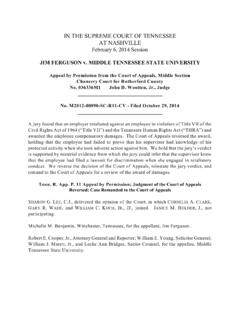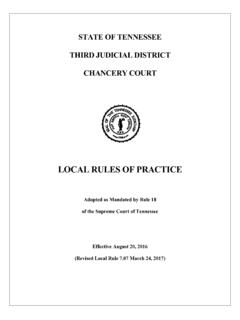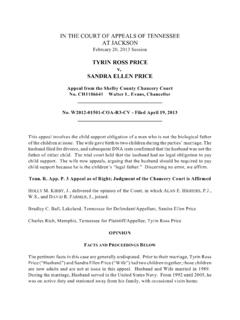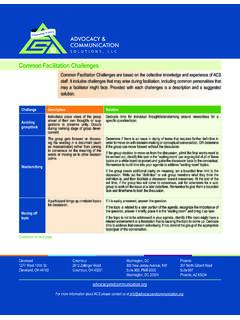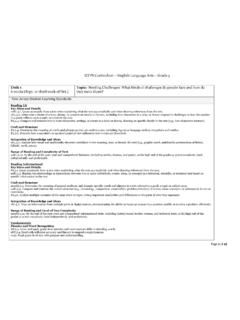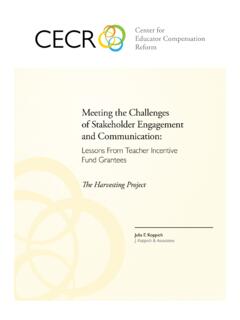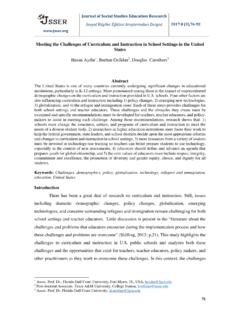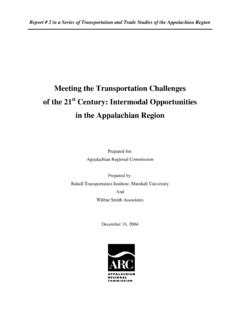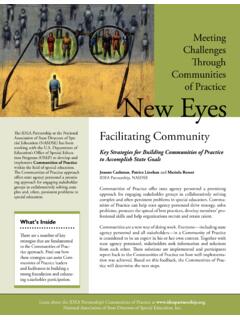Transcription of MEETING THE CHALLENGES OF SELF-REPRESENTED …
1 MEETING THE CHALLENGES OF SELF-REPRESENTED LITIGANTS A BENCH BOOK FOR GENERAL SESSIONS JUDGES OF THE STATE OF TENNESSEE An initiative of the Tennessee Supreme Court Access to Justice Commission Approved by The Tennessee General Sessions Judges Conference & endorsed by The Tennessee Supreme Court May 2013 INTRODUCTION A challenge for judges in seeking justice in their courts increasingly involves the issue of how to interact with SELF-REPRESENTED litigants. There is a growing and accepted school of thought that a judge must be pro-active in seeking and adopting policies and procedures that are friendly to all parties, including those represented by counsel and those representing themselves.
2 Many authorities now recognize, as does the Tennessee Supreme Court, that for a judge to do nothing to address the needs or problems faced by SELF-REPRESENTED litigants actually advances injustice and contributes to the loss of respect for the judicial system by a substantial portion of the public. This particular Benchbook seeks to address these issues in a compact and economical manner that can be used by courts on a daily basis. It can serve as a guide for judges in seeking to administer justice to all parties. For this reason, this Benchbook will not go into great detail regarding all reasons or foundations for the policies stated but will instead go directly to the heart of the recommended procedures.
3 Many articles and documents have been formulated across the United States and beyond on these issues. This Benchbook is intended to be informative and concise for the busy judge. It recognizes that judges must balance many cases every day and use their discretion to make decisions, while at the same time considering rules of procedure, rules of evidence, and judicial ethics. Judges also have their own styles, and courts have their own culture. The bottom line is for all courts and judges to seek justice for all in as neutral and unbiased and ethical a manner as possible. Our desire is that this Benchbook be of assistance to the judiciary and the judicial system as a whole by serving the interest of courts, parties, communities, and jurisdictions.
4 2 A DAY IN THE LIFE OF A TYPICAL COURT: A SUGGESTED FORMAT I. Before Court Begins: Establishing the Framework of Achieving Justice A. LOCAL GUIDELINES (OR RECOMMENDATIONS) AND HANDOUTS: Each court should draft and maintain local guidelines (or recommendations) dealing specifically with SELF-REPRESENTED litigants. For your consideration, a model set of local guidelines (or recommendations) has been drafted that can be used by any court that chooses to do so. Each court is free to create its own set of guidelines or to modify this set of guidelines for each specific jurisdiction. The local guidelines should be made available in handbook or brochure form as well as online through a county or court website if possible.
5 The local guidelines can describe for all litigants and attorneys the policies and procedures of the local court system. The guidelines can and should also address specific issues dealing with SELF-REPRESENTED litigants, including: (1) The importance of considering the use of legal counsel prior to filing an action in court or after being served with court process on a case. (2) A brief explanation of local procedures in court. These can include: (a) Calling of the docket (b) Dress code expectations and rules regarding cell phones, proper court etiquette, emphasis on need to be on time, etc. (c) Need to have live witnesses and not just written reports. (d) Exchange of exhibits with opposing side prior to beginning of trial or hearing.
6 (e) Simple terminology of courts. (f) Procedures of plaintiff s case and direct examination and cross examination, followed by procedures of defendant s case, etc. 3 (g) Other specific rules of local court (h) Explanation of the appeal process, including deadlines for appeal. B. HANDOUTS/BROCHURES FOR PRO SE LITIGANTS: Each court is encouraged to have simple rules or handouts which can be read easily by SELF-REPRESENTED parties and other non-lawyers which give simple information about the court and what to expect in court. C. COURTHOUSE KIOSK: Your county or court can sponsor a location for a kiosk/service center for assisting SELF-REPRESENTED litigants and other non-lawyers who have cases in court.
7 D. USING PROGRAMS OR TRAINING TO ASSIST self - represented PARTIES AND OTHER NON-LAWYERS WITH THEIR ACTIONS IN COURT: Courts are encouraged to utilize or develop programs to help SELF-REPRESENTED parties with court actions and to help streamline court procedure for all who are involved in judicial proceedings. Examples to be used by judges: (i) LAWYER OF THE DAY PROGRAMS: Use of lawyer of the day or similar programs are specifically endorsed as ethically acceptable as long as they operate within the confines of ethical rules and guidelines. Any lawyer operating within a lawyer of the day program should, of course, avoid real conflicts of interest, improper contact with parties, and other ethical violations.
8 As long as the SELF-REPRESENTED party understands the limitations under which a lawyer of the day is operating, such limited roles of lawyers are acceptable ethically. This includes advising litigants of court procedures and rules of evidence, attempts to resolve or mediate issues, and other simple acts of representation or unbundled services. (ii) LEGAL ADVICE CLINICS : Pro bono legal advice clinics are where lawyers meet with pro se litigants and give advice on what to do or what not to do, or advise litigants of what to expect in court, and 5 provide other valuable legal and common sense advice. (iii) PRO SE DOCKET DAY : Where lawyers are assigned on a rotating basis to assist pro se parties on what is clearly explained to be a one-day event only.
9 Pro Se Docket Days can also be a time when judges have a day of special instructions for people representing themselves where courts can give explanations of judicial expectations, simple rules of evidence and procedure, and assist SELF-REPRESENTED parties in having a greater understanding of what is going to happen in court. E. LEGAL AID BROCHURES: Legal Aid organizations should be allowed and encouraged to develop and distribute issue specific information brochures or pamphlets to assist pro se litigants. F. ROLE OF CLERKS: Judges and clerks should coordinate and understand limitations of clerks and their staffs, along with judicial secretaries or administrators.
10 The Guidelines for Tennessee Court Clerks Who Assist SELF-REPRESENTED Persons should be followed by all clerks and their personnel, which allows clerks to assist the public in a cordial and pleasant manner without providing legal advice. G. FORM DEVELOPMENT AND USE: The Tennessee Supreme Court Access to Justice Commission is in the process of creating standardized pleadings or other forms for use by the public. Any form approved by the Tennessee Supreme Court shall be considered universally acceptable as legally sufficient in all Tennessee courts. To date, the Court has approved several forms, including forms for divorces without children, and additional forms will be made available as those forms are approved by the Court.


